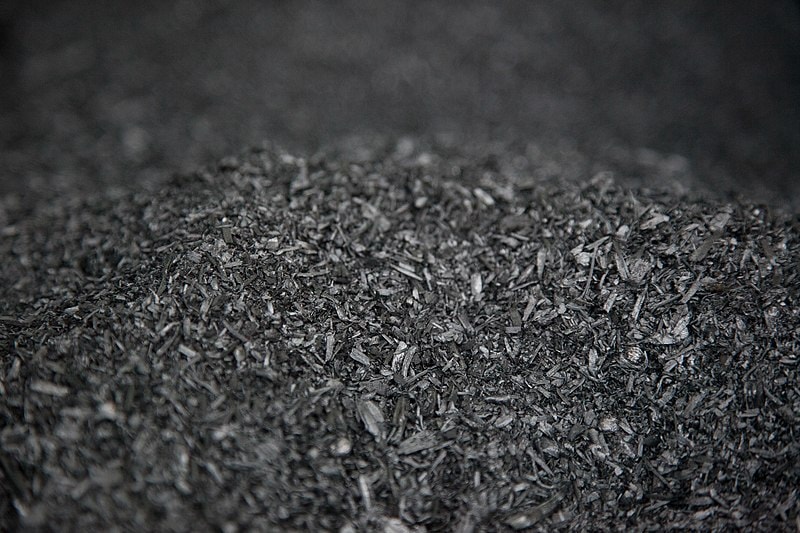Should I Add Biochar to My Soil? Benefits, Uses & FAQ
-
Shea Cummings
- Last updated:

One of the biggest struggles of any new gardener is wondering how to improve and maintain good soil quality. You can have the perfect amount of sun and get the plant food and watering just right, but if your soil isn’t up to the job, you won’t find a lot of success.
Composting and mulch are two common things used to improve soil quality. Another great option is biochar. But adding biochar needs a little bit more forethought than the other two. Let’s look at what biochar is and how much you should add to your soil.
What Is Biochar?
Organic material collected from forestry and agricultural waste, also known as biomass, is burned in a process called pyrolysis. The result is a charcoal-like material that effectively improves soil quality.
Essentially the process of pyrolysis is highly controlled burning in a container that contains next to no oxygen. The result is a much cleaner burn that retains the carbon and prevents it from burning into the atmosphere. After the biomass is burnt, the final product is approximately 70% carbon. However, this may vary slightly depending on the material being burnt and the precise pyrolysis method.
Grabbing a handful of biochar, you’ll notice that it has the appearance of charcoal: black, lightweight, and highly porous.
How Does it Improve the Soil?
- Increasing water retention without increasing overwatering
- Helps increase the pH level of the soil
- Improves the overall structure of the soil
- Regulates nitrogen leaching
- Improves microbial properties
In addition to helping improve soil, biochar is also a great addition to compost. It helps reduce nutrient loss as the compost ages, and it also helps to speed up the whole process because of the increase in microbial activity.
How Much Biochar to Use?
The size of your garden will be the ultimate factor that determines how much biochar you should use. Generally, you’ll want the top 6 inches of your soil to be approximately 5%–10% biochar.
There isn’t an exact science as to how much you should use, as it depends on what you’re growing. For example, some plants actually prefer more acidity in the soil. And if you add too much biochar, it raises the pH level, which means a lower acidity level.
Biochar Application
The most common way to apply biochar is to mix it 50/50 with a fertilizer such as compost. This charges the biochar with nutrients because it absorbs them from the compost. “Charging” the biochar before mixing it into the soil is essential because it can absorb nutrients from the soil and reduce its quality if you don’t.
- Top dressing: After mixing the biochar with compost, sprinkle it over your entire garden. Doing this over time will help with the continual improvement of the soil.
- Tilling: Using a rake or another similar tool is probably the most common way to mix biochar into the soil.
- Hand mixing: In smaller applications like potting or small gardens, simply using your hand to mix the biochar is convenient.
Considerations When Adding Biochar
There are a few things to consider when adding biochar:
Water
Over time, biochar can be washed out of the soil by watering. This is another reason that it’s a good idea to mix it with mulch or compost. By mixing it, you prevent it from being washed away easily.
Wind
If you are applying it on a windy day, you may waste a lot of this valuable soil additive. The best way to do this is to ensure it is moistened. Quite often, compost is fairly moist, so as long as you’re using compost to charge the biochar, you shouldn’t have to worry too much about wind.
Soil Quality
Pay attention to soil quality as you’re adding biochar. First, ensure that you’re charging it so it’s not leaching nutrients from the soil. Second, pay attention to the pH level of your soil to ensure that it’s still suitable for what you’re growing.
In Conclusion
Gardening can be a pretty big learning curve. Whether you are growing vegetables, flowers, or other plants, there are a million things to keep in mind. Biochar has been used for thousands of years, and applying it properly is a great way to improve soil quality. Suppose you’re ever in doubt as to how much you should be adding. In that case, your local plant nursery will likely have knowledgeable staff who can help you calculate the amount for your particular needs.
Featured Photo Credit: Biochar pile, Oregon Department of Forestry, Wikimedia Commons CC 2.0 Generic
Contents

